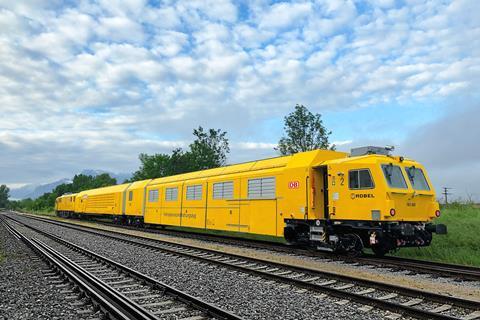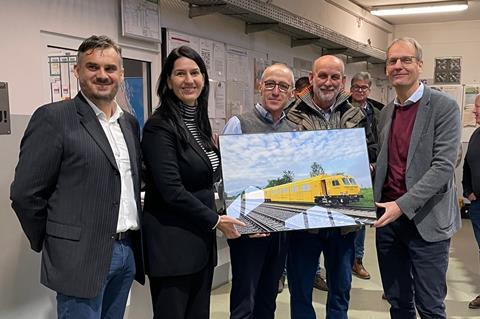
GERMANY: Infrastructure operator DB Netz has taken delivery of the country’s first Robel-built Mobile Maintenance System for use on specialist track maintenance work.
Branded by DB Netz as FIZ (Fahrbahninstandhaltungszug), the three-vehicle MMS is formed of a traction and supply unit with crew accommodation, toilet facilities and a workshop, an intermediate car for the storage, loading and unloading of material and tools, and an open-floor maintenance unit with two high-performance cranes and extending side walls where track work can be undertaken under cover and fully protected.
After the train has transported the crew, tools and materials to the worksite, the open-floored telescopic working module can be deployed at the push of a button, setting up a fully secured and illuminated worksite where all activities can take place inside the vehicle in a single pass.
The machine is similar to the MMS units which Robel has supplied to Austria, Norway and the Netherlands, as well as Network Rail in the UK and JR East in Japan.

DB Netz intends to trial FIZ in the Köln area, before extending the deployment to other parts of the country. It will be used for closure rail and switch inspection and replacement on turnouts, as well as build-up rail welding and the inspection of track-mounted antennae.
‘FIZ gives us the opportunity to provide a modern and safe working environment on the track’, said Dr Volker Hentschel, Head of Plant & Maintenance Management at DB Netz, when the machine was handed over in Duisburg on December 19. ‘This not only has a positive effect on productivity but also on the higher motivation of our staff.’
Robel Holding Head of Business Development Manuela Ruhland explained that ‘the maintenance train changes work processes, increases efficiency and saves costs. However, despite all the economic efficiency, one aspect is of particular importance to us: this train was built for people, for a safe and ergonomic working environment on the track.’

















